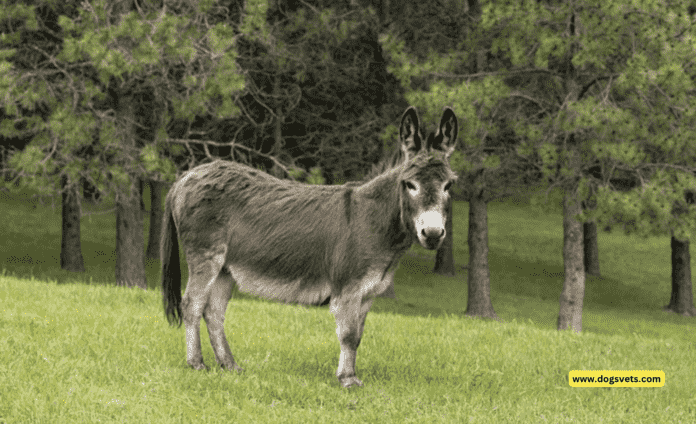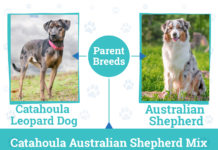Last Updated on February 26, 2024 by Dogs Vets
What are English-Irish Donkeys? A Complete Guide to These Charming Companions
The endearing English-Irish Donkey, a captivating blend of two distinct breeds, holds a special place in the hearts of many.
These gentle giants, known for their calm temperament, intelligence, and resilience, have served as loyal partners for centuries, gracing both farmlands and households.
But what exactly defines this unique breed? Delving into their history, characteristics, and care requirements will equip you with the knowledge needed to determine if an English-Irish Donkey might be the perfect addition to your life.
A Legacy of Strength and Versatility: Unveiling the English-Irish Donkey’s History
The origins of the English-Irish Donkey can be traced back to the 19th century.
During this period, Irish farmers sought to improve the size and strength of their native Irish Draught donkeys by crossing them with the larger English Working Donkeys.
The resulting offspring, the English-Irish Donkey, inherited the desirable traits of both breeds, becoming a versatile and dependable work animal.
These hardy creatures played a pivotal role in Irish agriculture, hauling carts, tilling fields, and transporting goods. Their exceptional stamina and gentle nature made them ideal companions for farmers, especially in the harsh and remote landscapes of rural Ireland.
However, the mid-20th century saw the rise of mechanization, leading to a decline in the demand for working animals.
Thankfully, the unique qualities of the English-Irish Donkey ensured their survival and continued development. They found favor as companion animals, prized for their docile nature, intelligence, and longevity.
Today, the English-Irish Donkey is recognized as a distinct breed, cherished by enthusiasts worldwide for their unique characteristics and versatile nature.
Exploring the English-Irish Donkey’s Characteristics
1. Appearance:

- Size: Standing between 13.2 and 14.2 hands (54-58 inches) at the shoulder.
- Build: Strong and well-proportioned, with a broad chest and powerful hindquarters.
- Color: Primarily bay, black, or brown, with occasional chestnut or gray variations.
- Head: Large and well-proportioned, with expressive eyes and long, floppy ears.
2. Temperament:
- Calm and gentle: Known for their even temperament and patient nature, making them ideal companions for children and adults alike.
- Intelligent: These quick learners are highly trainable and can be taught various commands and tricks.
- Independent: While affectionate, they also possess a healthy degree of independence, making them suitable for owners who appreciate a balanced and respectful relationship with their animals.
3. Versatility:
- Companion animals: Thrive in family settings and offer companionship to individuals of all ages.
- Therapeutic animals: Their calm demeanor makes them valuable companions in therapy settings for individuals with physical or emotional challenges.
- Light work: Can still assist with light farmwork such as pulling carts or grazing land.
4. Lifespan:
- Boasting a lifespan of 30-40 years, these hardy animals can be lifelong companions.
Essential Elements: Providing for Your English-Irish Donkey’s Needs
Caring for an English-Irish Donkey requires commitment and an understanding of their specific needs. Here’s a comprehensive guide to ensure your furry friend thrives:
1. Diet:
- Primarily grazers, they require access to high-quality hay and pasture.
- Supplement their diet with grain and fresh vegetables, ensuring portion sizes are appropriate to avoid obesity.
- Always provide clean, fresh water at all times.
2. Housing:
- Offer a spacious paddock with sheltered areas for protection from the elements.
- Provide bedding in their shelter to ensure comfort and warmth.
- Ensure fencing is secure and escape-proof.
3. Exercise and Enrichment:
- Regular turnout in a safe environment is crucial for physical and mental well-being.
- Provide enrichment activities such as puzzle feeders or interactive toys to stimulate their minds.
- Grooming strengthens your bond and helps monitor their health.
4. Veterinary Care:
- Schedule regular veterinary checkups for vaccinations, parasite control, and dental care.
- Maintain a regular deworming schedule to prevent parasitic infections.
5. Responsible Ownership:
While the previous section outlined the fundamental aspects of caring for an English-Irish Donkey, responsible ownership delves deeper.
Here are some additional considerations to ensure your donkey thrives for years to come:
1. Socialization:
- Donkeys are social creatures and require companionship. If you cannot provide constant companionship, consider pairing your donkey with another donkey or a compatible animal like a goat or sheep.
- Introduce new animals gradually under supervision to ensure a smooth integration.
2. Training:
- Positive reinforcement training is the most effective method for donkeys.
- Start training early using treats, praise, and patience.
- Consistency is key to successful training.
3. Hoof Care:
- Regular trimming by a qualified farrier is essential to maintain healthy hooves and prevent lameness.
- Frequency of trimming depends on individual factors like terrain and activity level.
4. Breeding:
- If you intend to breed your donkey, ensure you have the knowledge, resources, and facilities to provide proper care for the mother and foal.
- Responsible breeding practices are crucial to maintaining the health and well-being of the breed.
5. End-of-Life Care:
- As your donkey ages, their needs may change. Be prepared to adjust their careaccordingly, providing additional support as needed.
- Making difficult decisions about end-of-life care should be done in consultation with a veterinarian.
Living with an English-Irish Donkey: A Rewarding Experience
Owning an English-Irish Donkey comes with immense responsibility, but the rewards are truly remarkable. Their gentle nature, intelligence, and unwavering loyalty make them cherished companions for families and individuals alike.
By understanding their needs and providing them with proper care, you can forge a unique and lasting bond with these captivating creatures.
(FAQs) about English-Irish Donkeys:
1. Are English-Irish Donkeys good for first-time owners?
While generally docile and easygoing, English-Irish Donkeys still require commitment, understanding, and proper training. If you’re a responsible and dedicated individual willing to learn about their specific needs, they can be wonderful companions.
2. How much space do English-Irish Donkeys need?
The minimum recommended space is 1-2 acres per donkey, with additional space for exercise and enrichment. Remember, the more space, the better.
3. Can English-Irish Donkeys live in cold climates?
Their thick coats allow them to tolerate colder temperatures. However, they still require adequate shelter from wind, rain, and snow.
4. How much do English-Irish Donkeys cost?
The cost can vary depending on factors like age, pedigree, and location. Expect to pay anywhere from $2,000 to $10,000 or more for a well-bred English-Irish Donkey.
5. Are English-Irish Donkeys vocal?
They do vocalize using brays and grunts to communicate with each other and their owners. While not excessive, their vocalizations should be considered when choosing a location for your donkey.
6. What are some common health problems in English-Irish Donkeys?
Parasite infections, dental issues, and laminitis are some concerns. Regular veterinary checkups and proper care can help prevent these issues.
7. Where can I find more information about English-Irish Donkeys?
- Breed associations: The American Donkey and Mule Society (ADMS) and the British Donkey Society (BDS) offer valuable resources and information.
- Online resources: Websites dedicated to donkeys and equine care can provide additional insights.
- Veterinarians: Consulting a veterinarian experienced with donkeys is crucial for ensuring your donkey’s health and well-being.
By understanding the unique needs and characteristics of English-Irish Donkeys, you can make an informed decision about welcoming one into your life. Remember, responsible ownership requires dedication, but the rewards of companionship with these gentle giants are truly immeasurable.
Fact Check
We strive to provide the latest valuable information for pet lovers with accuracy and fairness. If you would like to add to this post or advertise with us, don’t hesitate to reach us. If you see something that doesn’t look right, contact us!























